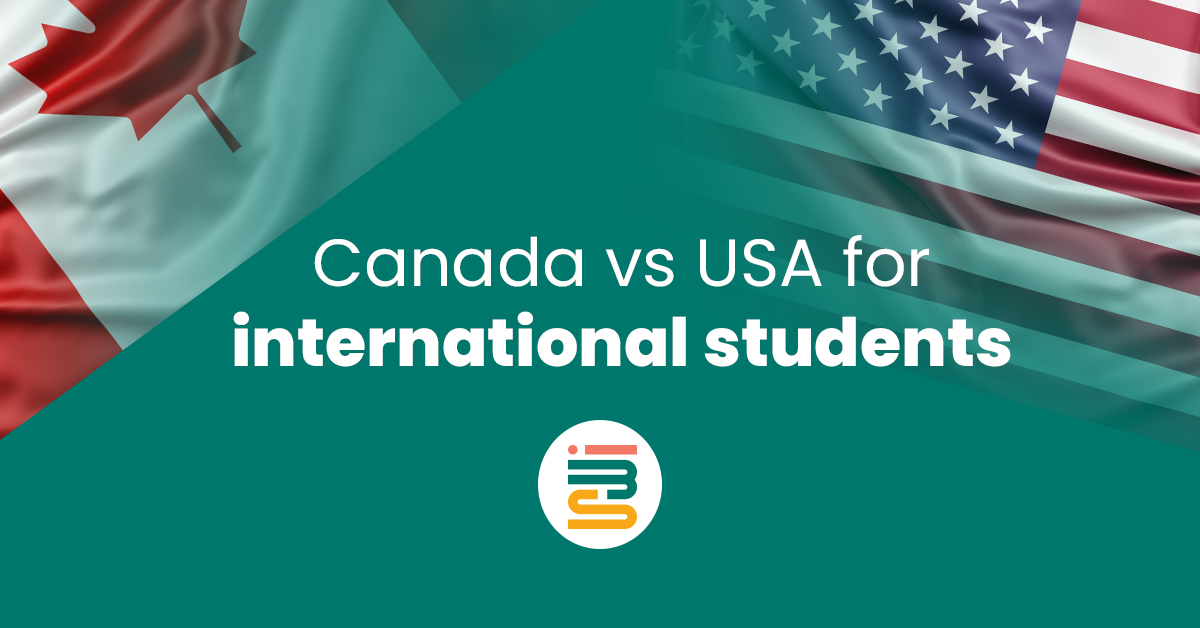Canada vs USA for International Students: A Comprehensive Guide
When deciding between Canada vs USA for international students, there are many factors to consider. This comprehensive guide will explore the educational systems, top universities, dual degrees, postgraduate options, scholarships, admission requirements, student visa requirements, employment opportunities, costs of studying, cost of living, and the best cities for international students in both countries.
Read More: Best universities in the usa to study medicine
The American vs The Canadian Educational Systems
The Education System in the USA
The education system in the USA is renowned for its diversity, offering a wide array of educational institutions that cater to international students. From prestigious universities to community colleges and vocational schools, each institution provides distinct opportunities for academic and career growth, making the USA a compelling choice for international education seekers.
- Junior or Community Colleges
Junior or community colleges in the USA offer two-year associate degrees and serve as a cost-effective option for many students. These institutions often have agreements with four-year universities, allowing students to transfer and complete their bachelor’s degrees.
- Vocational Schools
Vocational schools in the USA provide specialized training in specific trades or careers. These institutions focus on hands-on experience and practical skills, preparing students for immediate employment in their chosen fields.
- Universities
Universities in the USA are distinguished for their cutting-edge research facilities, extensive program diversity, and abundant extracurricular offerings. They provide comprehensive educational pathways encompassing undergraduate, graduate, and doctoral programs across a broad spectrum of disciplines, making them a magnet for ambitious students globally.
Read More: 10 reasons to study in USA for Nigerian students
The Education System in Canada
Canada’s education system is known for its high quality and inclusivity, providing numerous options for international students.
Curious about the advantages of pursuing your studies overseas? Reach out to IBS Consulting and book your FREE consultation to learn more!
Book Your Free Consultation
- Universities
Canadian universities offer a wide range of undergraduate and graduate programs. They are known for their strong emphasis on research and innovation.
- University Colleges
University colleges in Canada specialize in undergraduate education and occasionally offer select graduate programs. They are known for their intimate class settings and personalized educational approaches, fostering a supportive environment conducive to academic growth and student engagement. This makes them an appealing choice for those seeking a more tailored learning experience.
- Community Colleges
Similar to the USA, community colleges in Canada offer two-year associate degrees and certificates. They focus on practical and career-oriented education.
- Career and Technical Colleges
These institutions provide specialized training and certifications in various trades and technical fields, preparing students for specific careers.
Read More: How to study in the uk from nigeria
Top Universities in the USA vs Canada
List of the Top 10 Universities in the USA
- Harvard University
- Stanford University
- Massachusetts Institute of Technology (MIT)
- California Institute of Technology (Caltech)
- University of Chicago
- Princeton University
- Columbia University
- Yale University
- University of Pennsylvania
- University of California, Berkeley
List of the Top 10 Universities in Canada
- University of Toronto
- University of British Columbia
- McGill University
- McMaster University
- University of Alberta
- University of Montreal
- University of Calgary
- University of Ottawa
- Western University
- University of Waterloo
Read More: Post Graduate Degree Programs in the UK
Dual Degrees in the USA vs Canada
Dual Undergraduate Degrees in USA & Canada
Dual undergraduate degree programs in both the USA and Canada cater to ambitious students aiming for interdisciplinary expertise by enabling them to pursue two undergraduate degrees concurrently. These specialized programs are tailored for individuals with strong academic drive, offering a unique opportunity to expand knowledge across multiple fields simultaneously.
Dual Master’s Degrees in USA & Canada
Dual master’s degree programs are available in both countries, enabling students to gain advanced knowledge in two fields. These programs often include partnerships between different universities or departments.
Read More: Success Strategies for Nigerians Studying Abroad
Types of Postgraduate Degrees in the USA vs Canada
Postgraduate Degrees in the USA
The USA offers a wide range of postgraduate degrees, including master’s, doctoral, and professional degrees. Programs are often research-intensive and provide opportunities for teaching and industry collaborations.
Postgraduate Degrees in Canada
Postgraduate programs in Canada are recognized for their emphasis on research and close collaboration with industry sectors. Students have the opportunity to pursue master’s, doctoral, and specialized professional degrees, leveraging Canada’s strong academic networks and practical learning environments to advance their careers and contribute to cutting-edge research initiatives.
Read More: Scholarship exams to study abroad
Scholarships for International Students
Best 5 Scholarships in the USA
- Fulbright Foreign Student Program
- Hubert Humphrey Fellowship Program
- AAUW International Fellowships
- Joint Japan/World Bank Graduate Scholarship Program
- Rotary Peace Fellowships
Best 5 Scholarships in Canada
- Vanier Canada Graduate Scholarships
- Pierre Elliott Trudeau Foundation Scholarships
- Banting Postdoctoral Fellowships
- IDRC Research Awards
- Canada Graduate Scholarships – Master’s Program
Read More: Can neco be used to study abroad
Interested in learning more about the benefits of studying abroad? Call IBS Consulting to schedule a FREE consultation right away!
Book Your Free Consultation
Admission University Requirements
Admission Requirements in the USA
- Completed application form
- Standardized test scores (SAT, ACT, GRE, GMAT)
- Transcripts and diplomas
- Letters of recommendation
- Personal statement or essay
- Proof of English proficiency (TOEFL, IELTS)
Admission Requirements in Canada
- Completed application form
- Academic transcripts
- Letters of recommendation
- Statement of purpose
- Proof of English or French proficiency (TOEFL, IELTS)
- Additional documents for specific programs
Read More: Universities in Canada that accept wassce results
Student Visa Requirements
Student Visa Requirements in the USA
- F1 Student Visa
The F1 student visa is designated for individuals enrolled in academic programs at accredited institutions in the United States. Applicants must showcase financial stability and provide evidence of their intention to return to their home country upon completion of their studies. This visa category supports international students pursuing educational opportunities in the USA while maintaining the integrity of immigration regulations.
- J Exchange Visa
The J visa is for exchange students participating in approved exchange programs. It includes categories for students, interns, and scholars.
- M Student Visa
The M visa is for students enrolled in vocational or non-academic programs.
Student Visa Requirements in Canada
- Study Permit
A study permit is essential for international students planning to study in Canada. Applicants must demonstrate acceptance into a designated learning institution, show proof of sufficient funds to cover tuition and living expenses, and submit a statement of purpose outlining their educational goals. This permit ensures compliance with Canadian immigration requirements and facilitates a smooth transition into academic life in Canada.
Employment Opportunities for Students
Read More: Post graduate diploma in the usa
Employment Opportunities in the USA
International students in the USA have diverse employment opportunities, including on-campus jobs and internships, as well as Optional Practical Training (OPT) directly related to their field of study. OPT permits students to gain valuable work experience for up to 12 months after graduation, enhancing their career prospects while adhering to immigration regulations. This flexibility supports students in achieving their professional goals while studying in the United States.
Employment Opportunities in Canada
In Canada, international students can work on-campus or off-campus for up to 20 hours per week during academic sessions and full-time during scheduled breaks. Post-Graduation Work Permit (PGWP) allows graduates to work in Canada for up to three years.
Cost of Studying
Read More: Cost of studying engineering in usa for nigerian students
Cost of Studying in the USA
The cost of studying in the USA varies widely. Tuition fees range from $20,000 to $60,000 per year, depending on the institution and program. Additional costs include accommodation, books, and living expenses.
Cost of Studying in Canada
Studying in Canada is generally more affordable. Tuition fees range from $15,000 to $35,000 per year. Living expenses are also lower compared to the USA.
Cost of Living
Read More: Cost of studying nursing in usa for nigerian students
Cost of Living in the USA
The cost of living in the USA varies by location. Major cities like New York and San Francisco are expensive, while smaller towns and rural areas are more affordable. Average monthly expenses range from $1,000 to $2,500.
Cost of Living in Canada
Canada offers a lower cost of living, especially in smaller cities. Average monthly expenses range from $800 to $2,000, depending on the location.
Best Cities for International Students
Best Cities in the USA
- Boston, MA
- New York City, NY
- San Francisco, CA
- Los Angeles, CA
- Chicago, IL
Best Cities in Canada
- Toronto, ON
- Vancouver, BC
- Montreal, QC
- Ottawa, ON
- Calgary, AB
Frequently Asked Questions
What are the main differences between the education systems in the USA and Canada?
The main differences include the structure of institutions, types of degrees offered, and the emphasis on research. The USA offers more flexibility in program choices, while Canada focuses on inclusivity and research collaboration.
Which country offers more affordable tuition fees for international students?
Canada generally offers more affordable tuition fees compared to the USA.
What are the visa requirements for studying in the USA and Canada?
The USA requires F1, J, or M visas, while Canada requires a study permit.
>Contact us
Are there more employment opportunities for students in the USA or Canada?
Both countries offer significant employment opportunities, but the USA has a larger job market, while Canada provides easier pathways to work permits post-graduation.
Which cities are considered the best for international students in the USA and Canada?
Top cities in the USA include Boston, New York, and San Francisco. In Canada, top cities are Toronto, Vancouver, and Montreal.
How does studying in Canada vs USA for international students compare, and what are the key visa and residency requirements?
When considering Canada vs USA for international students, both countries offer unique benefits. In Canada, students need a Canadian study permit for courses longer than six months. The Canadian government provides pathways for permanent residence through programs like Express Entry and Provincial Nominee Programs. For a Canadian student visa, you’ll need to meet requirements such as proof of acceptance from a recognized institution and evidence of financial support. The visa process involves applying for a study permit or entry temporary resident visa, and the visitor visa fee varies. Additionally, opening a Canadian bank account is often required for managing finances while studying. The USA typically requires an F-1 student visa, which has its own set of requirements and visa process.
Conclusion
Deciding between studying in Canada vs USA for international students depends on various factors, including cost, employment opportunities, and personal preferences. Both countries offer high-quality education and unique experiences. To make the best choice, consider your academic goals, budget, and career aspirations. For personalized advice on studying abroad, book a free consultation with our experts today!





